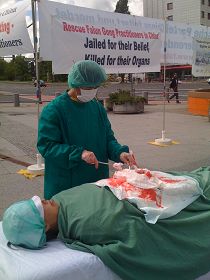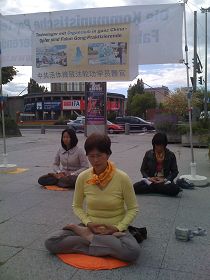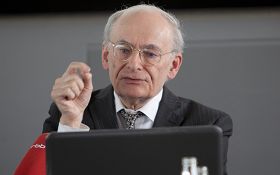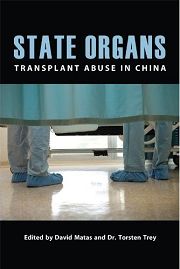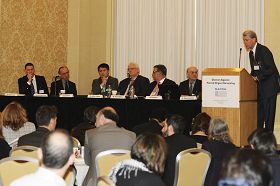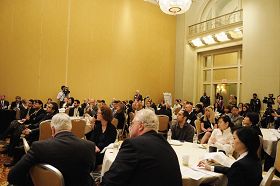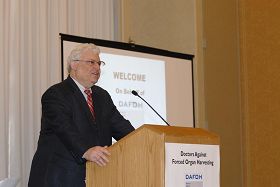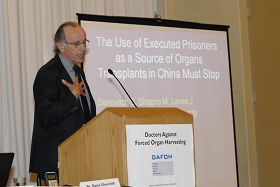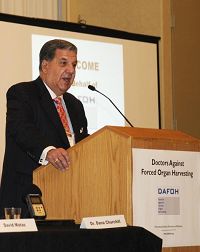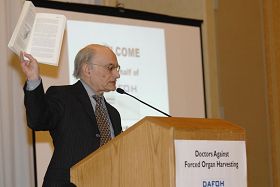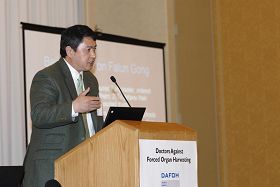"Never, never be afraid to do what's right, especially if the well-being of a person or animal is at stake. Society's punishments are small compared to the wounds we inflict on our souls when we look the other way."
―Martin Luther King Jr.
Take a stand and voice your concern by signing a petition asking your congress person to express their concern regarding organ harvesting.
Link: http://www.stoporganharvesting.org/contact-your-representatives#sampleletter
If your outside the United States.
Link: http://www.dafoh.org/petition-to-the-united-nations/
"Transplant abuses of this magnitude are crimes against humanity. Remaining silent in the face of such atrocities is to be complicit in these crimes."
― Drs. Caplan, Centurion, and Xu, petition initiators
Organ Transplants Tremendously Profitable

While fees for organ transplants vary between different hospitals, they are high across the board.
China Southern Weekend [Nanfang Zhoumo] reported, "The Oriental Organ Transplant Center's rapid growth has brought about huge revenue and profits. According to previous media reports, liver transplants alone bring the Center an annual income of 100 million yuan".
According to a Phoenix Weekly 2006's report,In 2004, the fee for a liver transplant at the Oriental Organ Transplant Center was USD 32,000 (approximately 250,000 yuan). In 2005, it was over USD 40,000 (approximately 330,000 yuan). Some intermediary agencies charged a brokering fee as high as USD 13,000.
Here is an example of fees for different organ transplants published by CITNAC (China International Transplantation Network Assistance Center ). [1]
Fees for Organ Transplants (U.S. Dollars)
| Kidney transplant | $62,000 |
| Liver transplant | $98,000 - $130,000 |
| Liver and kidney transplant | $160,000 - $180,000 |
| Kidney and pancreas transplant | $150,000 |
| Lung transplant | $150,000 - $170,000 |
| Heart transplant | $130,000 - $160,000 |
Reference:
[1] Cost of organ transplant,China International Transplantation Network Assistance Center, its web site (www.zoukiishoku.com) was shutdown soon after organ harvesting was exposed, the Internet archive is not available now (The original site can request archive.org to remove the archived copy),saved screenshot.A New Source of Organs: Detained and Missing Falun Gong Practitioners
Contrary to most death row inmates who are addicted to alcohol, cigarettes, and drugs, Falun Gong practitioners are required to refrain from such substances and are generally very healthy. In particular, young practitioners from rural areas are thought to have become a key target for live organ harvesting.Blood Testing of Detained Falun Gong Practitioners
Some Chinese prisons have a regulation to provide "periodic physical exams" for inmates. In reality that is hard to carry out. However, the health checklist for Falun Gong inmates is different from the one used for regular inmates. According to a 2004 Xinhuanet website report on the Shanghai Tilanqiao Prison, common physical exam items for regular inmates included "taking blood pressure, listening to the heart and lungs, palpating the liver and spleen area, and taking chest X-rays," which would cost roughly 60 yuan. [1] Blood tests are not done routinely on regular inmates. For detained practitioners, on the other hand, blood tests, which are a key step in organ matching, were very common.In July 2009, during the taping of "Between Life and Death," New Tang Dynasty Television (NTDTV) interviewed several practitioners who had undergone such blood tests during their detention.
Ms. Gan Na, who currently lives in Toronto, Canada, was from Beijing. She was a former customs official at the Beijing Airport. In 2001, when she was detained for the third time at the Xin'an Women's Forced Labor Camp, she was given a blood test, X-rays, an electrocardiograph test, and eye exams. She told NTDTV, "It seemed very strange to me at the time. The guards at the forced labor camp had never treated us like we were human, yet we were given this thorough physical exam. It felt very strange."
While practitioners in labor camps are possible victims of organ harvesting, those missing could face a more horrible fate.
No
forced labor camp or prison in China would detain an inmate who did not
have a name or address for long because they could not complete the
registration process. These inmates would be transferred to other
locations.
Many Falun Gong Practitioners Who Refused to Reveal Their Names and Addresses Went Missing
A phenomenon worth mentioning here is that the regime has adopted a vicious implication policy in its persecution of Falun Gong practitioners. Members of a practitioner's family can be fired from their jobs; supervisors at the person's workplace can be punished; co-workers can lose their bonuses; in some cases, even local government officials can lose their positions. Through this policy, the regime solates Falun Gong practitioners and turns everyone against them. As a result, others are more willing to participate in the persecution. Those who previously sympathized with Falun Gong become resentful when they lose their bonuses, and local government officials do everything they can to prevent Falun Gong practitioners from going to Beijing to appeal so they can save their positions. Local public security members have been dispatched to Beijing to stop local practitioners from appealing to the Central Office of Letters and Calls; the Beijing Office of the local government has turned into a police station to arrest and detain Falun Gong practitioners who have gone to Beijing.To resisting the regime's implicating policy, many practitioners who went to appeal refused to reveal their names and addresses to the authorities. Based on practitioners' sharing articles on the Minghui website, resisting the demands to reveal identity and location became a common practice after 2000. What has happened to these practitioners? Many of them went missing and likely were detained in large concentration camps. In hindsight, the detention of these practitioners in large numbers would have helped facilitate large scale live organ harvesting.
In their book, Bloody Harvest, The killing of the Falun Gong for their organs, authors David Matas and David Kilgour interviewed many Falun Gong practitioners around the world who had been detained in China. These practitioners all mentioned that they had met many practitioners in detention centers who refused to reveal their names and addresses, and they eventually went missing. At the same time, many of the missing practitioners' families did not know that these practitioners had gone to appeal for Falun Gong and therefore had no idea of their whereabouts. The harsh reality is they do not know where to find their loved ones.
Guo Guoting, a Chinese lawyer living overseas, confirmed that one of his clients, Huang Xiong, whom he represented while he was in Shanghai, was in a similar situation. Huang Xiong went missing from his dorm in Shanghai Jiao Tong University, and his whereabouts remain unknown.
In "New Leads in the Investigation of the Sujiatun Concentration Camp," a practitioner stated, "After December 20, 2000, the number of practitioners sent to detention centers suddenly increased to dozens or even over a hundred each day, whereas previously only about one dozen practitioners would be sent there... All practitioners were assigned a number... Within a few days the cells were full. The guards interrogated them each day and asked for their names. They used electric batons and other forms of torture on the practitioners and also encouraged the inmates to beat the practitioners. Most of the practitioners still refused to tell their names. The guards finally stopped asking and said, 'Ok, if you refuse to tell me, I'll send you to a place where you will tell.'
"In early 2001, groups of practitioners were sent away in big buses in the early morning every other day. An 18-year-old girl from Shandong Province shared the same cell with me. Her number was K28. One morning her number was called by mistake. She got on the bus but later returned. She said all of the practitioners were being taken to northeastern China. Later, the guards openly told us that they were sending the practitioners to northeastern China. During that period, many of them were sent there from Beijing." [2]
Existence of "Concentration Camps"
An insider who worked in a mainland Procuratorate once told us that no forced labor camp or prison in China would detain an inmate who did not have a name or address for long because they could not complete the registration process. These inmates would be transferred to other locations. Then what happened to those missing Falun Gong practitioners? In March 2006, a whistleblower alerted the world to the possibility of live organ harvesting from Falun Gong practitioners at the Sujiatun Detention Center in Shenyang City, Liaoning Province. Thus, a potential new source of organs was identified.[1] Xinhua Net, "Hearing of Commutation Cases Is a Beneficial Exploration", http://news.xinhuanet.com/comments/2004-06/10/content_1518473.htm
[2]Clearwisdom.net, "New Leads in the Investigation of the Sujiatun Concentration Camp," http://www.clearwisdom.net/emh/articles/2006/3/22/71075.html
China's Organ Transplant Market Skyrocketed After 2003
- There were more than 600 hospitals and over 1,700 doctors engaged in organ transplant surgeries in 2007. [1]
- United States has about 130 hospitals specializing in liver transplant surgery, and fewer than 244 kidney transplant centers, according to CNN and the National Kidney Center.

Number of completed liver transplant surgeries published on the website of Tianjin Oriental Organ Transplant Center in 2004. The center claimed its quantity was No. 1 in the world.[2]
 Number
of completed liver transplant surgeries published on the website of No.
2 Hospital of the Second Military Medical University.[3]
Number
of completed liver transplant surgeries published on the website of No.
2 Hospital of the Second Military Medical University.[3] Chinese Experts' Figures on Organ Transplants
Chinese experts' figures on organ transplants, although they vary, clearly indicate the massive growth in China's organ market. Between 2003 and 2006, underground hospitals emerged as well. The organ transplants from these underground hospitals are very likely not included in the public statistics. Therefore, the number of actual organ transplants during this period should be higher than the public data.Huang Jiefu, deputy Minister of Public Health, co-authored an article on The Lancet, "Government Policy and Organ Transplantation in China". Huang revealed an organ transplant quantity graph of China for 1997-2007. [4]
 (Jiefu Huang, Organ Transplant Quantity Graph of China for 1997-2007. Source: [4])
(Jiefu Huang, Organ Transplant Quantity Graph of China for 1997-2007. Source: [4]) (This graph is derived from Huang's by combining kidney and liver transplant quantity together)
(This graph is derived from Huang's by combining kidney and liver transplant quantity together)Shi Bingyi, director of the Organ Transplant Center of PLA, said there were 90,000 transplants in China until 2005. There were about 10,000 kidney transplants and 4,000 liver transplants in 2005 alone. [5] Shi admitted that China organ transplant reached the peak in 2006, there were 20,000 transplants. [6]

Using the data provided by Huang Jiefu and Shi Bingyi, as well as reports by the Chinese media, we have created the following table to show the trend in China's organ transplant market. In it, we have divided the period from 2000 to 2008 into three phases: prior to 2003, between 2003 and 2006, and after 2006.
2000 - 2008: Three phases in China's Organ Transplant Market
| Phase | Timeframe | Annual No. of Organ Transplants | Main source of donors |
|---|---|---|---|
| Phase I | Prior to 2003 | 5000-6000 | Death row inmates |
| Phase II | Between 2003 and 2006 | 12,000 - 20,000 | Death row inmates and other unknown sources |
| Phase III | 2007 - 2008 | less than 10,000 | Death row inmates and living donors among relatives |
But this doesn't address the sudden, large increase in transplants from 2003 to 2006.

A descriptive graph using data from publication on The Lancet 2008 by Jiefu Huang, former Deputy Minister of Public Health of China; and interviews on China’s official media by Bingyi Shi, director of the Organ Transplant Center of PLA (People’s Liberation Army).
Reference:
[1] 中国叫停“器官移植旅游” (China Stops "Organ Transplant Tourism"), China Southern Weekend magazine(南方周末), 2007, http://www.infzm.com/content/9556, saved screenshot.
[2] Two weeks waiting time, Oriental Organ Transplant Center in Tianjin, http://web.archive.org/web/20060207021805/http://www.ootc.net/, saved screenshot.
[3] Organ Transplant Institute of the People's Liberation Army in Shanghai, http://web.archive.org/web/20050317130117/http://www.transorgan.com/about_g_intro.asp, saved screenshot.
[4] Government Policy and Organ
Transplantation in China, Jiefu Huang, The Lancet,
http://download.thelancet.com/flatcontentassets/series/china/comment11.pdf
[5] 器官移植要设高门槛(Set a high threshold),
Health News(建康报),
http://web.archive.org/web/20060826070646/http://www.transplantation.org.cn/html/2006-03/394.html,
saved screenshot.
[6] 供体短缺是制约器官移植事业发展的瓶颈 (Donor shortage is
a bottleneck restricting the organ transplant) ,ScienceNet(科学时报),
http://paper.sciencenet.cn/html/showsbnews1.aspx?id=182075, saved screenshot.
[7] Public Call for Organ Donations, China Daily, 2009, http://www.chinadaily.com.cn/china/2009-08/26/content_8616938.htm, saved screenshot.
T]he Committee takes cognizance of the allegations presented to the Special Rapporteur on Torture who has noted that an increase in organ transplant operations coincides with “the beginning of the persecution of [Falun Gong practitioners]” — United Nations Committee Against Torture, 2008
Death Row Inmates: Math does not add up
Admitting the wide use of organs from death row inmates and denying allegations of organ harvesting from living Falun Gong practitioners, while resolutely opposing any independent investigation into these allegations, is the Chinese regime's current stance.Admitting to a Lesser Crime
Using China’s public record, here is a simple math:
1. Executed prisoners accounted for major organ source. [1] Before 2007, even as high as over 90%. Only about 130 people in China signed up to donate their organs between 2003 - 2009. [2]2. The number of death row inmates has decreased since 1999. [3][4]
3. During 2003-2006, there was a big surge of organ transplants.[5][6][7]
Question:
Where did those organs for the big surge come from? |

A descriptive graph
using data from publication in The Lancet 2008 by Jiefu Huang, former
Deputy Minister of Public Health of China; and interviews on China’s
official media by Bingyi Shi, director of the Organ Transplant Center of
PLA (People’s Liberation Army). See Quantity Skyrocketed.
|
| Declining Number of Death Row Inmates |
Unusual Jump in Number of Organ Transplants
|
(note: The news of organ harvesting of
Falun Gong practitioners first broke out in 2006. After that, the
Chinese regime might either become more restrained or simply manipulate
the number.)
Broadened Definition of “Executed Prisoners”?
Chinese communist authorities vilify, dehumanize, depersonalize and marginalize Falun Gong even more than executed prisoners. Falun Gong practitioners are indeed treated much worse than death row inmates.When Chinese regime finally admits death row inmates as the main organ source after repeated denial for decades, one may ask does it mean Falun Gong practitioners are lumped together with the “death row inmates” or it is a tactic to intentionally hide the more cruel and barbaric facts that Falun Gong practitioners are killed for organs?
More Reading:
How Many Organs Were Provided by Death Row Inmates in China Per Year?Numbers based on an "estimation formula":Math doesn't add up
Falun Gong Practitioners Systematically Murdered for Their Organs: Refuting the Chinese Regime's "Death Row" Explanation (Chinese Version: 死刑犯撑不起中国器官移植市场上的蘑菇云)
Reference:
[1] "Sow Change, Harvest Hope", Caixin Online, http://english.caixin.com/2012-11-13/100459689.html[2] China Daily reported that live organ transplants account for 15 urgery cases in 2006. The number has now approached 40%, 65% which are from death row inmates. China Daily, "Public Call for Organ Donations," http://www.chinadaily.com.cn/china/2009-08/26/content_8616938.htm
[3] Duihua Foundation, http://s.wsj.net/public/resources/images/WO-AJ170_CORGAN_NS_20120323164803.jpg
[4] 中国死刑数量明显下降 “枪下留人”比例仍较大 (The number of death row executions has decreased significantly), China News, 09/06/2007, http://www.sh.chinanews.com.cn/Article_Show.asp?ArticleID=31395
[5] Government Policy and Organ Transplantation in China, The Lancet, Jiefu Huang, http://download.thelancet.com/flatcontentassets/series/china/comment11.pdf
[6] 器官移植要设高门槛(Set a high threshold), Health News (建康报), http://web.archive.org/web/20060826070646/http://www.transplantation.org.cn/html/2006-03/394.html
[7] 供体短缺是制约器官移植事业发展的瓶颈 (Donor shortage is a bottleneck restricting the organ transplant), ScienceNet (科学时报), http://paper.sciencenet.cn/html/showsbnews1.aspx?id=182075
Germany: Exposing the Communist Regime's Crime of Live Organ Harvesting to the International Congress of the Transplantation Society Held in Berlin (Photos)
July 26, 2012 | By Wu Sijing in Berlin
(Minghui.org) The 24th International Congress of the Transplantation Society was held in Berlin, Germany, July 15-19, 2012. Doctors from around the world who attended the meeting could see a group of Falun Gong practitioners gathered every day at the square in front of the International Congress Center (ICC) in Berlin. Some of them were meditating, and behind them were banners that exposed the Communist regime's crime of harvesting the organs from living Falun Gong practitioners. Others in the group handed out informational materials. Many attendees leaving the ICC congress center could see them. Some stopped to inquire, while others told the practitioners that they had learned about the ongoing crime taking place in China from other sources.
A forum on “Transplant Medicine at a Crossroads” was held on July 18 in Berlin. Pictured (from left) are: American writer Ethan Gutmann, Canadian lawyer David Matas, and French physician Dr. Harold King
Falun Gong practitioners reenact the CCP's atrocity of live organ harvesting in front of the meeting venue of the International Congress on the Transplantation Society
Practitioners demonstrate the exercises in front of the Transplantation Society meeting venue
Practitioners wanted to tell these physicians, surgeons, and scientists attending the congress that an estimated more than 10,000 Falun Gong practitioners in China have had their organs forcibly removed while they were still alive, and the harvested organs were sold for lucrative profits. These practitioners' bodies were then quickly cremated to destroy any evidence of the perpetrators' crimes.
During the congress on July 18, Doctors Against Forced Harvesting (DAFOH) held a forum on “Transplant Medicine at a Crossroads” near the congress venue. They discussed how to stop live organ harvesting in China.
DAFOH is an international organization founded by physicians of different specialties and is based in Washington, D.C. Their goal is to stop all illegal organ trafficking practices in China and other countries.
CCP-Sanctioned Organ Harvesting
Canadian lawyer Matas calls for boycotting Chinese doctors and medicine
The CCP regime publicly acknowledged for the first time in 2005 that 95% of the transplanted organs were from executed prisoners. This statement verified a suspicion that had long been speculated by the outside world: the harvesting of organs is supported by the CCP regime.
Mr. David Matas, along with Mr. David Kilgour, former Canadian Secretary of State for Asia and the Pacific, made an independent investigation into the allegations of large scale organ harvesting from Falun Gong practitioners by the CCP. They published their investigation report in 2006 and later the report was published in book form under the title “Bloody Harvest.” Mr. Matas held that taking organs from executed prisoners cannot be considered voluntary organ donation. In other words, the act of forced removal of organs and the auxiliary system have long existed under CCP rule.
Dr. Arne Schwarz from Switzerland once worked in a hospital for years as an IT expert. He said that illegal trade in organs exists in many countries, but in China there are two differences: 1. China is the only country whose government permits illegal trade in organs; 2. China's military hospitals make huge profits through illegal organ trade.
Chinese Doctors' Movements Restricted
The more than 160 Chinese doctors who attended the international congress were restricted in their interactions with the outside world. While the doctors from other countries could come and go as they pleased and lunch wherever they wished at noon, that was not true for the Chinese doctors. They were taken to and picked up from the congress venue in three big vans at a fixed time and location, had lunch together inside the congress center, and never came out.
Many doctors from other countries passed by Falun Gong practitioners' information booth, spoke with practitioners, and watched their exercise demonstration. But not the Chinese doctors. So the practitioners took the initiative to hand out information about organ harvesting from living Falun Gong practitioners where the Chinese doctors got on and off the vans in the morning and evening. They hoped that the doctors from China could free themselves from the CCP's restrictions and learn the facts about Falun Gong and the persecution, no longer assist the CCP in persecuting practitioners, and stand up to expose this atrocity.
New Book Further Exposes the CCP's Atrocities of Live Organ Harvesting (Photo)
July 24, 2012 | By Minghui correspondent Wang Ying
(Minghui.org) As practitioners from around the world hold activities to mark the start of their 13-year efforts to end the persecution by the Chinese Communist Party (CCP) around July 20, a new book, State Organs, which further exposes the CCP's atrocities of harvesting organs from living Falun Gong practitioners has been published and distributed. This is another powerful work which follows the publication of Bloody Harvest that will enable the general public to learn about the CCP's atrocities.
Front cover of the New Book State Organs
State Organs is written by authors from 4 continents, from 7 countries, from different professional backgrounds. It is a book of essays that approach the transplant abuse and unethical organ procurement in China from different angles. It includes essays that summarize witness reports, official information, historical timelines and in-depth analysis of the situation in China. The authors also discuss ways to combat the transplant abuse in China.
Dr. Torsten Trey: CCP has a secret source of organs
Dr. Torsten Trey, spokesperson for Doctors Against Organ Harvesting, said in his essay that usually, the donors agree to donate organs with free consent; however in China, according to official statements, more than 90% of organs come from executed prisoners. This is already a breach of western medical ethical standards, but even with this official statement, there are approximately 2,000-8,000 executions per year that should deliver organs for 10,000-20,000 transplants per year. Given limiting factors like age, health status, infectious diseases among prisoners, blood type, tissue factors and the short waiting times, the official explanation appears insufficient to account for so many transplants. It suggests that there is another source for organs. Without an effective public organ donation program, it suggests that there is another secret source of organs.”
Given that Falun Gong practitioners are detained and physically examined (including costly diagnosis like blood samples, urine tests, x-rays, ultra-sound), while at the same time subjected to torture, it raises the question about the objective of such diagnostic procedures. And according to the investigation by David Matas and David Kilgour in Bloody Harvest, it suggests that followers of the Falun Gong spiritual practice are the subjects of this secret source of organs.
“Killing human beings for their organs in order to provide transplantation for others... leads transplant medicine as well as medicine in general into ad absurdum,” said Dr. Trey in his essay.
Director of a University in the US : CCP sentences prisoners to death with the purpose of harvesting their organs
Dr. Arthur Caplan, director of the Center for Bioethics at the University of Pennsylvania, discusses in his essay the phenomenon of transplant tourism and organ trafficking in general. He highlights that the free choice to donate organs is “crucial” and concludes that the practice in China to harvest organs from executed prisoners or detainees is not up to ethical standards of the world. The situation in China runs the risk that prisoners will be sentenced to death for the purpose of harvesting their organs.
Dr. Caplan calls for an end of the current organ procurement practice in China and calls upon the world to “adopt a stronger stance against this unacceptable source of organs.”
“The present system of relying on organs from executed prisoners ought to be changed. But, it should not be changed in the next three to five years. It ought to be changed in the next three to five minutes!” said Dr. Caplan in his essay.
Nephrology Department Chief from Malaysia: People travel to China for organs
Nephrology Department chief Dr. Ghazali Ahmad in the Hospital Kuala Lumpur describes transplant tourism in the Asian region, and how the donor regions shifted from India to China. He presents medical documents that show how Malaysian citizens returned from China after receiving a transplant. He noticed that patients were hastily dismissed from China, that the aftercare letter was usually poorly documented, and that after 2006, the documentation completely ended, and patients returned to Malaysia without any medical documentation. The year 2006 was when allegations first emerged that organs were being harvested from living Falun Gong practitioners and the first investigative report of Matas and Kilgour was published.
Think Tank Scholar: The persecution occurring in China is a crime against humanity
Ethan Gutmann, the author of Losing the New China, and former U.S. think tank researcher discusses in his essay the recent political changes in China with regard to Bo Xilai and Wang Lijun, and that both are CCP followers who likely have known about or participated in organ harvesting. Mr. Gutmann gives an analysis on the estimated number of Falun Gong practitioners who were subjected to organ harvesting, and includes quotes from approximately 40 witnesses that he has interviewed in relation to the organ harvesting. He also discusses the persecution of Falun Gong.
He wrote in his essay, “What has occurred [in China] is a crime against all humanity. ... Above all, no Western entity possesses the moral authority to allow the [CCP] to bury the full history of genocide in exchange for promises of medical reform.”
Zhang Erping: CCP harvests organs from living Falun Gong practitioners
Zhang Erping, Falun Gong spokesperson, provides insight into the Chinese culture and transplant laws in China. The first law to allow harvesting organs from executed prisoners dates back to 1984. There was a shortage of organs in China, because of the Confucius belief system that the body needs to stay intact after death, and that also explains the absence of a public organ donation program in China.
Mr. Zhang then describes various forms of transplant abuse in China, including organ harvesting from living Falun Gong practitioners.
Mr. Zhang wrote in his essay, “It raises serious concerns when there is lack of transparency regarding the source of organs as well as the number of executions taking place each year in China: who are these prisoners and for what crimes are they executed?”
David Matas: The numbers related to transplants given by the CCP are implausible
Canadian internationally renowned human rights lawyer David Matas looks into the numbers and other statements that were given by Chinese sources. His observation is that many of the numbers related to transplants given by Chinese authorities are implausible. He then deducts how many Falun Gong practitioners could be subject to organ harvesting.
David Kilgour: Strong actions should be taken to end the atrocities of live organ harvesting
David Kilgour, former Canadian Secretary of State for Asia-Pacific and Canadian educator Jan Harvey, the co-authors, give insights into the persecution of Falun Gong and provide examples of Falun Gong practitioners who were persecuted and organs removed.
They also deliver a timeline of the organ harvesting in China. And suggest how people should react.
They wrote in their essay, “No action is too strong to discourage a barbaric practice which violates both the foundation of human dignity -- respect for the human body -- and the essence of ethical standards in medicine.”
Israeli Expert: Israelis will no longer go to China for organ transplants
Dr. Jacob Lavee, Israeli heart surgeon, talks about his own experience of having a patient who went to China for a heart transplant with two weeks advanced notice. After he got curious and did his own research, he learned about the organ harvesting from prisoners in China. Dr. Lavee then describes how he initiated an end to this transplant tourism by discouraging patients from going and simultaneously implementing a new transplant law which generated an increase of organ donations in Israel by over 60% in one year. The essay is reflects an amazing path of combating an evil practice by taking individual initiative.
Dr. Lavee wrote in his essay: “The Israeli legal approach has successfully managed to disengage Israeli candidates for organ transplantation from getting their organs in China.”
Medical Director: Doctors should condemn the CCP's barbaric organ harvesting
Dr. Gabriel Danovitch, Professor of Clinical Medicine, Nephrology and Medical Director for the Kidney& Pancreas Transplant Program, takes a look into the procedures of accepting transplant related scientific papers from China for western medical journals. He noticed a lack of due diligence when medical journals accepted papers in which the Chinese authors spoke of 'standard methods' when they meant to 'gunshot to the head'. Such scientific research should NOT become part of western scientific knowledge.
Dr. Danovitch reminds the reader, that, although we might not have control over China, we have control over our medical journals and should not sacrifice our ethical standards in our research. With his essay, Dr. Danovitch elaborates that doctors in the free world have a space to reject and condemn the practices in China. He thus suggests that medical journals do not accept transplant related scientific papers from China, and that doctors from China not be allowed to present transplant related data at medical conferences, unless they explicitly say that their findings are not derived from executed prisoners' organs.
Dr. Danovitch wrote in his essay: “We cannot control events in China, but, at the very least, we can control the content of our meetings and journals and work towards the day when Chinese organ transplantation will take its place as an honored and respected part of the international organ transplant community.”
Human Rights Experts in Switzerland: Transplanted organs should have traceability
Swiss human rights expert Dr. Arne Schwarz elaborates on pharmaceutical companies performing clinical trials in China with transplant related drugs, like anti-rejection drugs. The patients that are enrolled in those clinical trials, have received their transplant organs in China. However, according to the Vice-Health minister, 90% of the organs come from executed prisoners, hence there is a reasonable likelihood that the patients enrolled in such clinical trials have a transplant organ that has been unethically procured, which then creates an ethical problem regarding the drugs that are tested in those trials, and then later sold worldwide. Dr. Schwarz elaborates on this complex topic by referring to some companies, and reminds readers that the WHO in its guiding principle on human cell, tissue and organ transplantation demands traceability of transplanted organs and transparency to scrutiny. He is calling upon corporate responsibility to ensure ethical standards.
“Thus, under these circumstances, delegating organ procurement to an abusive transplant system is irresponsible,” wrote Dr. Schwarz in his essay.
Professor of Medicine: Take action to protect those who are being harmed by others
Dr. Maria Fiatarone Singh is professor of Geriatric Medicine at the University of Sydney in Australia. When she heard about the organ harvesting from living Falun Gong practitioners in China she was shocked, and despite not being related to transplant medicine, she got curious and actively involved in the work of DAFOH. Dr. Singh then had the experience of being approached by a Chinese who claimed to be a student who said that the harvesting of organs does not exist. He then also stated that the massacre on Tiananmen Square in 1989 didn't happen, either. The Transplantation Society of Australia and New Zealand (TSANZ) decided that Australian transplantation training programs would not accept Chinese surgeons unless they signed a written contract that they would not use prisoners as a source of transplants once they returned to China. After this policy was put in place, no more Chinese transplant surgeons came to Australia for training.
Dr. Singh wrote in her essay, “As physicians, we are bound by our oath to prevent harm, and this includes acting to protect those who are being harmed by others. As humans, we can do no less.”
She quoted American anthropologist Margaret Mead, “Never doubt that a small group of thoughtful, committed citizens can change the world. Indeed, it is the only thing that ever has.”
International Transplant Experts Call for Stopping China’s Forced Organ Harvesting (Photos)
(Clearwisdom.net) China’s forced organ harvesting is an inescapable responsibility for the global transplant community, including transplant patients, voiced a panel of experts in Philadelphia on May 1. Held alongside the 2011 American Transplant Congress, the panel discussion, titled Global Transplant Community at Medical Crossroads, saw a hotel ballroom full of participants with some standing at the door.
Hosted by the NGO Doctors Against Forced Organ Harvesting (DAFOH), the panel raised the question of how the transplant community in the West should respond to China’s use of organs harvested from executed prisoners and unidentified sources, an unacceptable practice according to the international medical ethical standards.
Hosted by the NGO Doctors Against Forced Organ Harvesting (DAFOH), the panel raised the question of how the transplant community in the West should respond to China’s use of organs harvested from executed prisoners and unidentified sources, an unacceptable practice according to the international medical ethical standards.
A panel of experts in the discussion, from left to right: spokesperson Dr. Damon Noto of Doctors Against Forced Organ Harvesting, Dr. Gabriel Danovitch, Dr. Erping Zhang, Dr. Arthur Caplan, Dr. Eric Goldberg, and Lawyer David Matas.
Discussion venue. Many attendees of the 2011 American Transplant Congress attended the panel discussion.
Dr. Arthur Caplan, Emanuel and Robert Hart Professor of Bioethics and Philosophy, Director, Center for Bioethics, and Chair, Department of Medical Ethics, University of Pennsylvania
Dr. Gabriel Danovitch, medical director for the Kidney & Pancreas and professor at the University of California at Los Angeles
Dr. Eric Goldberg, senior medical director of ICON, a global clinical research company
Human rights lawyer David Matas, who co-authored the book, "Bloody Harvest: Organ Harvesting from Falun Gong Practitioners in China," with David Kilgour.
Dr. Erping Zhang, spokesperson for Falun Gong, at the panel discussion session held on May 1 in Philadelphia at the American Transplant Congress.
Pharmaceutical Companies
International pharmaceutical companies have played a major role in helping to perpetuate the unethical practice of organ harvesting through their drug trials in China, according the speakers at the panel discussion.
Dr. Eric Goldberg, senior medical director of ICON, a global clinical research company, pointed out that the low cost of developing clinical trials in China—roughly 15 percent of that in the United States—makes it very appealing to the pharmaceutical companies that try to develop drugs with a limited budget in a recessive economic environment, adding that China also offers the companies the extra benefit of speeding up the drug development process by having a large number of patients and fewer regulations.
“The issues that we deal with at the FDA, the EMA, [and] Health Canada, they just don’t exist in China. There’s much less scrutiny” Dr. Goldberg said.
Dr. Eric Goldberg, senior medical director of ICON, a global clinical research company, pointed out that the low cost of developing clinical trials in China—roughly 15 percent of that in the United States—makes it very appealing to the pharmaceutical companies that try to develop drugs with a limited budget in a recessive economic environment, adding that China also offers the companies the extra benefit of speeding up the drug development process by having a large number of patients and fewer regulations.
“The issues that we deal with at the FDA, the EMA, [and] Health Canada, they just don’t exist in China. There’s much less scrutiny” Dr. Goldberg said.
Yet while many international pharmaceutical companies have carried out research in China, not many are ready to acknowledge their roles on the issue of China’s unethical organ harvesting, according to the panel’s speakers.
The well-known human rights lawyer David Matas, who co-authored the book, Bloody Harvest: Organ Harvesting from Falun Gong Practitioners in China, with David Kilgour, singled out the Swiss pharmaceutical company Roche as an example.
According to Matas and Kilgour’s investigation in the years 2002-2006 there were 41,500 transplant operations for which the Chinese regime could not provide a source. They believe detained Falun Gong practitioners are the most likely source for these organs. The well-known human rights lawyer David Matas, who co-authored the book, Bloody Harvest: Organ Harvesting from Falun Gong Practitioners in China, with David Kilgour, singled out the Swiss pharmaceutical company Roche as an example.
While being questioned about the issue of unidentified organ sources in relation to its transplant patients in China, Roche’s response, as Mr. Matas showed in his slide on Sunday’s panel discussion, was “Roche is not in charge of the supply of organs … Roche is not entitled to know the source of transplant organs.”
Roche’s former CEO and present chairman of the board of directors said, “In China there were no ethical or cultural stoppages for transplant medicine,” according to Mr. Matas, who noted that the statement is an acknowledgement of Roche’s knowingly conducting clinical trials in China while not showing concern for the unethical practices behind them.
Ignorance on the part of the companies about the sources of transplanted organs is not an acceptable reason in the eyes of the panel’s speakers.
“They can’t say they don’t know where the organ came from. They can’t say they don’t care where the organ came from” said Dr. Caplan, professor of Bioethics at the University of Pennsylvania in Philadelphia, who was one of the panel’s speaker and is also the keynote speaker of the 2011 American Transplant Congress.
Roche won two shame prizes in 2010: the Public Eye Swiss Award and the Public Eye People Award for “irresponsible corporate behavior.” A Dutch investment bank Triodos disinvested from Roche in September 2010.
Mr. Matas reported a watch list of multinational pharmaceutical companies that have conducted clinical trials on organ transplant anti-rejection drugs in China, including Wyeth (now part of Pfizer), Novartis, Roche, and Astella. These trials were performed on patients who receive organs harvested in China. Roche won two shame prizes in 2010: the Public Eye Swiss Award and the Public Eye People Award for “irresponsible corporate behavior.” A Dutch investment bank Triodos disinvested from Roche in September 2010.
Last month, on the issue of China’s unethical organ harvesting, The Epoch Times tried to solicit comments from a number of pharmaceutical companies, and four companies are on Mr. Matas’s watch list. Both Isotechnika, a biopharmaceutical company based in Alberta, Canada, and Norvatis, a Basel-based pharmaceutical company, have responded.
Professional Responsibilities
The panel’s speakers unanimously agreed that it’s high time for the global transplant community to step up in ending the unethical organ harvesting practice in China.
The lack of scrutiny in China doesn’t exempt transplant medical professionals from their responsibility to keep up with the international standard in medical ethics.
Another panel speaker, Dr. Gabriel Danovitch, medical director for the Kidney & Pancreas Transplant Program at the Department of Medicine of UCLA, said the global transplant community has power to effect a positive change on the Chinese government. “We don’t have cruise missiles or tanks. But we do have some power by virtue of professional acceptance.”
He expressed deep concerns about the lack of critical eyes on China in the transplant community. Leading medical journals’ editorial boards keep accepting research papers from China on organ transplant.
An example Dr. Danovitch used in his slides was an article published in the American Journal of Transplantation last year, which has a sentence that provides no critical scrutiny on China’s dubious organ harvesting practice.
“The Chinese procedure also has the advantages of being very accessible and relatively inexpensive as compared to Western centers. … It is also possible to procure an organ in a relatively short time,” according to Dr. Danovitch.
The lack of scrutiny in China doesn’t exempt transplant medical professionals from their responsibility to keep up with the international standard in medical ethics.
Another panel speaker, Dr. Gabriel Danovitch, medical director for the Kidney & Pancreas Transplant Program at the Department of Medicine of UCLA, said the global transplant community has power to effect a positive change on the Chinese government. “We don’t have cruise missiles or tanks. But we do have some power by virtue of professional acceptance.”
He expressed deep concerns about the lack of critical eyes on China in the transplant community. Leading medical journals’ editorial boards keep accepting research papers from China on organ transplant.
An example Dr. Danovitch used in his slides was an article published in the American Journal of Transplantation last year, which has a sentence that provides no critical scrutiny on China’s dubious organ harvesting practice.
“The Chinese procedure also has the advantages of being very accessible and relatively inexpensive as compared to Western centers. … It is also possible to procure an organ in a relatively short time,” according to Dr. Danovitch.
He encouraged the western transplant society to use the power to make a positive change in China. “If we don’t exercise it, we’ll fritter it away,” he said.
Dr. Goldberg gave a personal testimony of how he exercised his professional power. After learning about the organ-harvesting situation in China, he went to persuade his company not to include China in its clinical trials.
“Fortunately for me personally and fortunately for the world, I received the backing that I needed,” said Dr. Goldberg, who was very happy for and proud of his company—ICON.
“There are commercial implications here of a multibillion dollar world famous company to do the right thing, so I became proud of that,” he said.
Dr. Erping Zhang, spokesperson of Falun Gong and one of the panel’s speakers, emphasized the importance for transplant professionals to take full responsibility on the issue.
“History will not only judge on what we have done, but also on what we didn’t do while we could,” said Dr. Zhang.
Posting date: 5/8/2011 Dr. Goldberg gave a personal testimony of how he exercised his professional power. After learning about the organ-harvesting situation in China, he went to persuade his company not to include China in its clinical trials.
“Fortunately for me personally and fortunately for the world, I received the backing that I needed,” said Dr. Goldberg, who was very happy for and proud of his company—ICON.
“There are commercial implications here of a multibillion dollar world famous company to do the right thing, so I became proud of that,” he said.
Dr. Erping Zhang, spokesperson of Falun Gong and one of the panel’s speakers, emphasized the importance for transplant professionals to take full responsibility on the issue.
“History will not only judge on what we have done, but also on what we didn’t do while we could,” said Dr. Zhang.
Category: Other Related Articles
Chinese version available at http://www.minghui.org/mh/articles/2011/5/7/国际知名专家吁制止中共活摘器官(图)-240296.html
Former U.N. Special Rapporteur Calls Allegation of Organ Harvesting in China Credible (Photo)
(Clearwisdom.net) “It is credible! It has been checked and in particular there is a statistical link to the repression against Falun Gong on the one hand, and the dramatic rise in organ transplantation. At the same time, we don't really know where all those organs are coming from.”
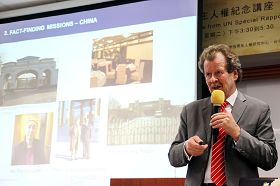 Professor Manfred Nowak, expert on international human rights law, speaks at National Taiwan University |
Nowak said the definition of torture was causing severe physical and/or mental pain or suffering. For example, the police used pressure and violence to elicit confessions, or gave permission to discriminate against the suspect. The means of torture were inhumane and trampled on human dignity, making the victim feel powerless and defenseless.
Professor Nowak served as the U.N. Special Rapporteur on Torture from 2004 to 2010. He was the first U.N. official to be sent to China to investigate torture. Since August 2006, Nowak and Asma Jahangir, U.N. Special Rapporteur on Freedom of Religion or Belief, have submitted to the Committee Against Torture numerous testimonies about the CCP harvesting organs from living Falun Gong practitioners, and requested information from the CCP regarding the source of organs for transplant. He said, “It is the obligation of the government to provide any results, but we have never received any kind of [information]. They just refuted it, to say that it was a totally wrong allegation, but they never provided me with any kind of more scientific information or any other answers explaining this high number and very quickly rising number of organ transplants.”
For many years the annual report on human rights by the United Nations continued to criticize the Chinese Communist Party for the persecution of Falun Gong. Nowak mentioned the difficulty of torture investigations when he went to China. “It was the only country where they finally deprived me of taking any cameras to prisons, so I couldn't take any photos inside. I had to make a decision [whether to continue the investigation]. Usually I wouldn't do it. But I felt it was important to be in educational labor camps because Falun Gong were put into these in particular.”
In Nowak's report to the United Nations in 2006, two thirds of the torture cases by the CCP were of Falun Gong practitioners. The 2007 report listed many Chinese organ transplantation centers and detention centers charged for harvesting organs from living Falun Gong practitioners.
Posting date: 11/13/2011
Category: Other Related Articles
Chinese version available at http://minghui.ca/mh/articles/2011/11/11/前联合国专员-对中共活摘器官指控可信(图)-249086.html
Abundance of Organs Transplanted Still a Reason for Suspicion
(Clearwisdom.net) Investigations into the Chinese Communist Party's (CCP) crimes of harvesting organs from living Falun Gong has drawn attention from around the world. Despite the CCP's denials, the apparent abundance of organs available for transplant inside China remains a grave concern. Below are three accounts sent in by sources in China.
One week to find a suitable liver for transplant
One of my friends is a senior manager in a foreign-based company. He was diagnosed with liver cancer on February 2010 and required surgery. Within a week, on February 25, doctors at the Zhongshan Medical School in Guangzhou City notified him that a suitable liver had been located and that they could do the surgery immediately. According to my friend, four other people were to have liver transplants at the same time as he, and several others were to have kidney transplants. All the patients were told that the organs were from executed prisoners. The First Hospital of Zhongshan Medical School is located on No. 2 Zhongshan Road in the Yuexiu District in Guangzhou City.
Newspaper report leaves source of kidney transplants unaccounted for
An article dated March 4, 2011, in the Dahe Newspaper from Zhengzhou City, Henan Province, reported that there had been over 400 kidney transplants in Henan Province in 2010. The same article stated that there were only four voluntary donors that year. The article also went on to say that the organs used in transplants mainly came from the voluntary donations of prisoners facing the death penalty. In a culture where the concept of violating the “whole body” after death is still largely taboo, it is highly unlikely that 400 executed prisoners from the same province donated their organs in the same year.
Relative receives a kidney transplant seven days after tissue sampling
One of my relatives was diagnosed with chronic renal failure in 1999. By 2001, his kidney had deteriorated to the extent that he required a transplant. The surgery took place in the Third Hospital of Beijing University. Prior to 2001, there was no department for kidney transplants in that hospital.
It only took seven days from the time the doctors took tissue samples from my relative to him having surgery. Another patient had tissue samples taken the same day, and had surgery the day after my relative's. During surgery, the doctor found the transplant kidney was not suitable and had to abort the operation until the following day, when they obtained another kidney. We were told that the kidneys came from Shenyang City.

